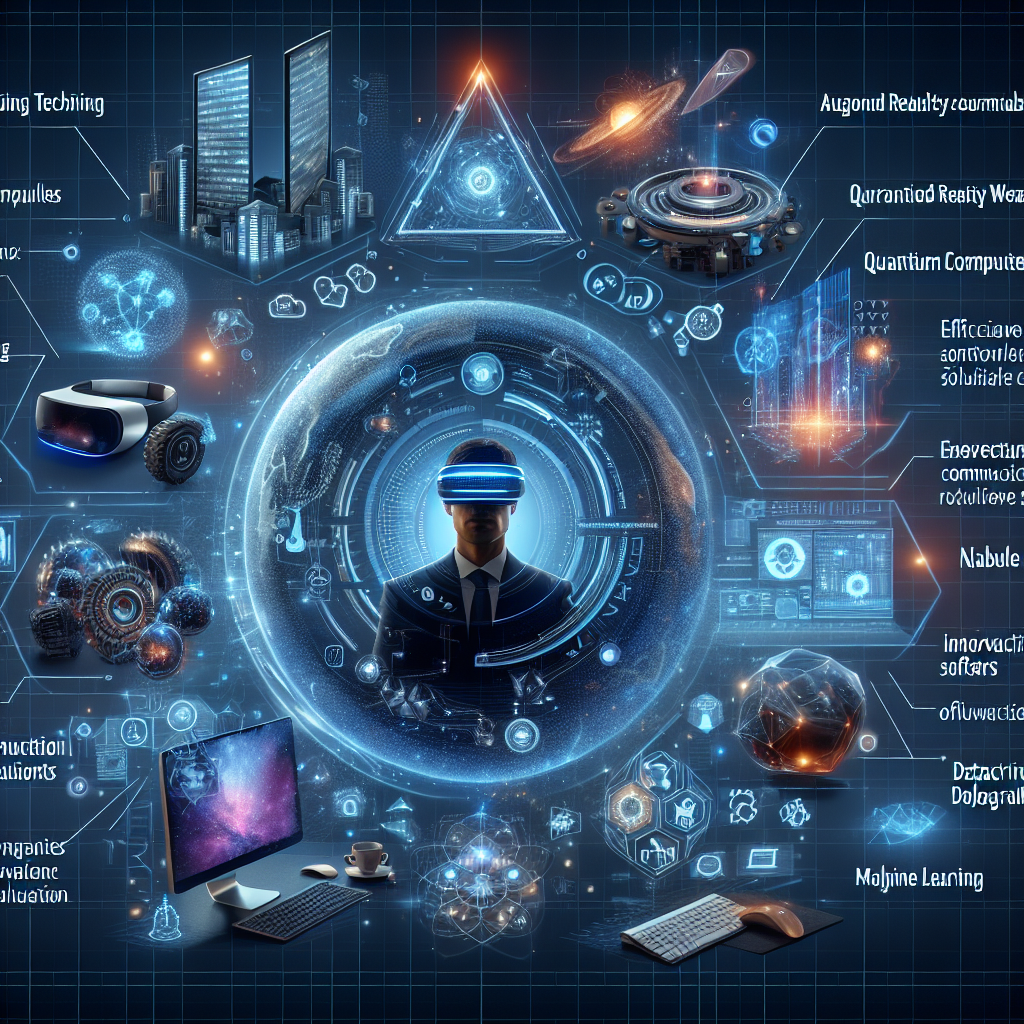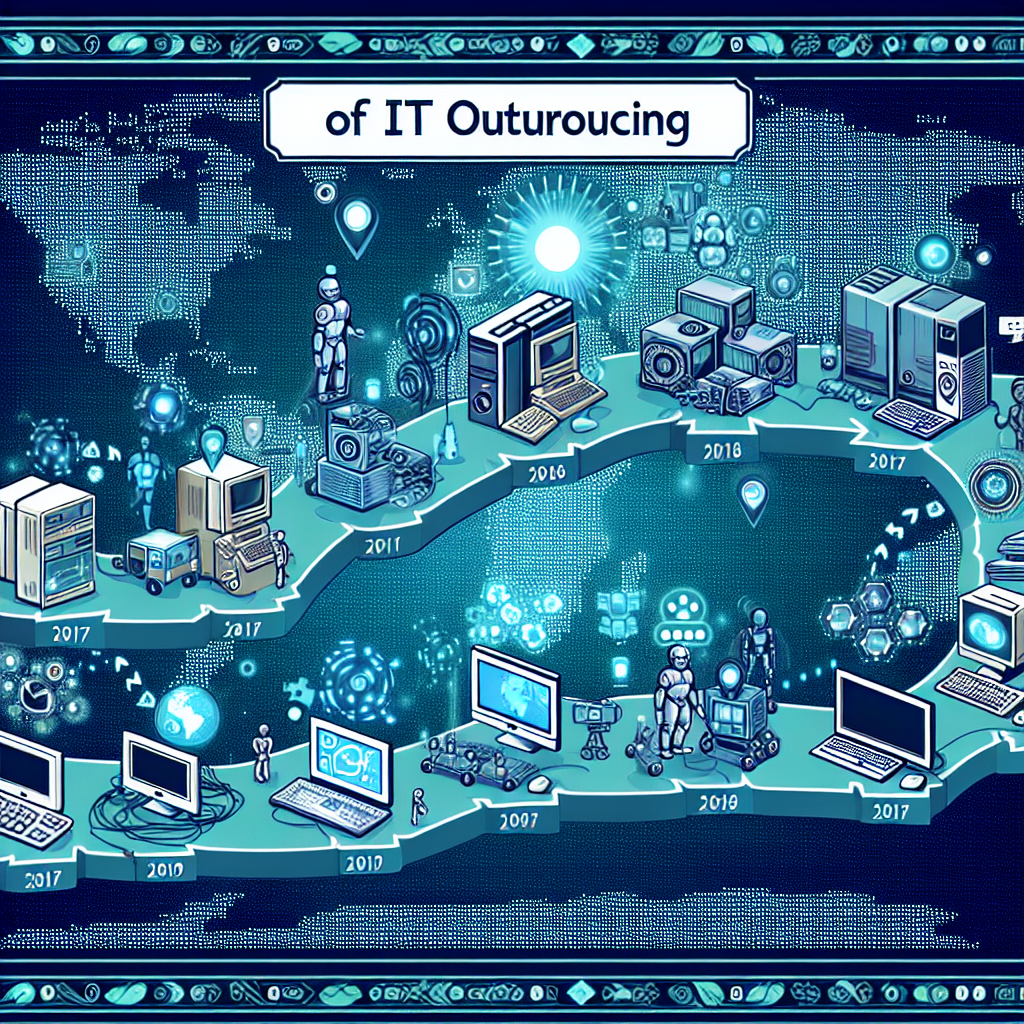Your cart is currently empty!
Tag: Future

The Future of Help Desk Technology and Trends to Watch
Help desk technology has come a long way in recent years, and the future looks brighter than ever. As companies strive to provide excellent customer service and support, the tools and technologies they use to manage help desk interactions are evolving rapidly. From AI-powered chatbots to virtual reality support, here are some of the key trends to watch in help desk technology.Artificial Intelligence (AI) is transforming the help desk industry, making it easier and more efficient for companies to provide support to their customers. AI-powered chatbots can handle routine customer inquiries and provide instant solutions, freeing up human agents to focus on more complex issues. These chatbots can also learn from past interactions, improving their accuracy and effectiveness over time.
Another trend to watch is the rise of self-service portals and knowledge bases. These resources allow customers to find answers to their questions on their own, reducing the need for human intervention. Companies are investing in creating comprehensive knowledge bases that are easy to navigate and search, providing customers with the information they need quickly and efficiently.
Virtual reality (VR) is also making its way into the help desk industry, offering new ways for customers to interact with support agents. VR support allows customers to connect with agents in a virtual environment, where they can receive hands-on assistance and guidance. This technology is especially useful for complex technical issues, where visual demonstrations and simulations can help customers understand solutions more effectively.
Analytics and data insights are becoming increasingly important in the help desk industry. Companies are using data to track customer interactions, generate reports, and identify trends and patterns that can help improve the overall support experience. By analyzing customer data, companies can identify areas for improvement and make data-driven decisions to enhance their help desk operations.
In addition to these technological trends, companies are also focusing on improving the customer experience through personalization and customization. By tailoring support interactions to individual customer needs and preferences, companies can create a more personalized and engaging experience for their customers. This can include personalized greetings, proactive support, and targeted recommendations based on customer history and preferences.
As the help desk industry continues to evolve, companies are investing in new technologies and strategies to provide better support to their customers. By embracing AI, self-service portals, VR support, data analytics, and personalization, companies can create a more efficient and effective help desk experience for their customers. The future of help desk technology looks promising, with exciting new developments on the horizon.

The Future of IT Infrastructure Management: Trends to Watch
In today’s fast-paced and ever-evolving digital landscape, IT infrastructure management has become more crucial than ever. With the increasing reliance on technology to drive business operations, companies are constantly looking for ways to optimize their IT infrastructure to ensure seamless operations and stay ahead of the competition.As we look towards the future of IT infrastructure management, there are several key trends that organizations should keep an eye on. These trends are shaping the way businesses manage their IT infrastructure and are set to have a significant impact on the industry in the coming years.
One of the key trends to watch is the rise of cloud computing. Cloud computing has revolutionized the way businesses manage their IT infrastructure by providing a scalable and cost-effective solution for storing and accessing data. With the increasing adoption of cloud services, organizations are moving away from traditional on-premise infrastructure towards cloud-based solutions.
Another trend to watch is the increasing focus on automation and artificial intelligence in IT infrastructure management. Automation tools are being used to streamline IT operations and reduce manual intervention, while AI technologies are being leveraged to predict and prevent potential IT issues before they arise. This shift towards automation and AI is helping organizations to improve efficiency, reduce costs, and enhance overall performance.
Security is also a key trend in IT infrastructure management, as organizations are facing an increasing number of cyber threats and attacks. With the growing complexity of IT infrastructure, it is more important than ever for businesses to invest in robust security measures to protect their data and systems. This includes implementing advanced security protocols, conducting regular security audits, and staying ahead of emerging threats.
Lastly, the trend towards hybrid IT environments is also worth watching. As organizations strive to balance the benefits of cloud computing with the need for on-premise infrastructure, many are opting for hybrid IT solutions that combine the best of both worlds. This approach allows businesses to leverage the scalability and flexibility of the cloud, while still maintaining control over critical data and applications.
In conclusion, the future of IT infrastructure management is evolving rapidly, driven by advancements in technology and changing business needs. By staying informed about these key trends and embracing new technologies, organizations can position themselves for success in the digital age. As we look towards the future, it is clear that IT infrastructure management will continue to play a critical role in driving business growth and innovation.

The Future of Managed Service Providers: What to Expect in the Next Decade
Managed Service Providers (MSPs) have been a vital part of the IT industry for many years, providing businesses with the support and services they need to manage their technology infrastructure. As technology continues to evolve at a rapid pace, the role of MSPs is also changing, and we can expect to see some significant shifts in the industry over the next decade.One of the biggest trends that we can expect to see in the future of MSPs is the increasing use of artificial intelligence (AI) and automation. AI technologies are already being used by many MSPs to streamline their operations and provide more efficient services to their clients. In the future, we can expect to see AI playing an even larger role in managing and monitoring IT systems, allowing MSPs to identify and address issues before they become major problems.
Another trend that we can expect to see in the future of MSPs is the increasing focus on cybersecurity. With the rise of cyber threats and data breaches, businesses are more concerned than ever about protecting their sensitive information. MSPs will need to stay ahead of the curve when it comes to cybersecurity, offering advanced solutions to keep their clients’ data safe from hackers and cyber attacks.
The future of MSPs will also be shaped by the growing demand for cloud services. As more businesses move their operations to the cloud, MSPs will need to adapt their services to meet the needs of their clients. This may involve offering more cloud-based solutions, helping businesses migrate to the cloud, and providing ongoing support for cloud-based systems.
In addition to these trends, we can also expect to see MSPs expanding their services to include a wider range of IT solutions. As businesses become more reliant on technology for their day-to-day operations, they will look to MSPs to provide a comprehensive suite of services to meet all of their IT needs. This may include services such as network management, data backup and recovery, and disaster recovery planning.
Overall, the future of Managed Service Providers is bright, with plenty of opportunities for growth and innovation. As technology continues to evolve, MSPs will need to stay ahead of the curve, offering cutting-edge solutions to help their clients succeed in the digital age. By embracing AI, cybersecurity, cloud services, and a wider range of IT solutions, MSPs can position themselves as indispensable partners for businesses of all sizes.

Lessons Learned from COVID-19: How the Pandemic Has Shaped Business Continuity Practices for the Future
The COVID-19 pandemic has brought about unprecedented challenges for businesses around the world. From sudden lockdowns and supply chain disruptions to remote working and economic uncertainty, companies have had to adapt quickly to survive and thrive in the face of a global crisis. As we begin to emerge from the pandemic, it is important to reflect on the lessons learned and how these experiences can shape business continuity practices for the future.One of the key lessons learned from the pandemic is the importance of having a robust business continuity plan in place. Many companies were caught off guard by the rapid spread of the virus and the resulting shutdowns, leading to significant disruptions in operations. Those businesses that had a well-defined continuity plan in place were able to pivot quickly and continue operating, albeit in a different capacity. Moving forward, it is crucial for companies to regularly review and update their continuity plans to ensure they are prepared for any future crises.
Another important lesson from the pandemic is the value of agility and flexibility in business operations. The ability to quickly adapt to changing circumstances, such as shifting to remote work or implementing new safety protocols, was critical for businesses to survive during the pandemic. Companies that were able to pivot their operations and embrace new ways of working were better positioned to weather the storm. Going forward, businesses should prioritize agility and flexibility in their operations to be better prepared for any future disruptions.
Communication is another key lesson learned from the pandemic. Clear and transparent communication with employees, customers, and stakeholders was vital during the crisis to keep everyone informed and engaged. Companies that were able to effectively communicate with their stakeholders were able to build trust and loyalty, even in the face of uncertainty. Moving forward, businesses should prioritize communication as a key component of their business continuity plans to ensure they can effectively navigate future crises.
Lastly, the pandemic has highlighted the importance of investing in technology and digital transformation. Companies that had already embraced digital tools and technologies were able to transition to remote work more seamlessly and continue operating despite the challenges of the pandemic. Moving forward, businesses should continue to invest in technology and digital transformation to improve their resilience and agility in the face of future disruptions.
In conclusion, the COVID-19 pandemic has been a wake-up call for businesses around the world, highlighting the importance of preparedness, agility, communication, and technology in ensuring business continuity. As we move forward from the pandemic, it is crucial for companies to take these lessons to heart and incorporate them into their business continuity practices for the future. By doing so, businesses can better position themselves to navigate any future crises that may come their way.

Key Trends in Network Management for the Future
Network management is an essential component of any organization’s IT infrastructure, ensuring that networks are running smoothly and efficiently. With the rapid evolution of technology, network management has also been evolving to keep up with the changing landscape. As we look towards the future, there are several key trends that are shaping the future of network management.One of the key trends in network management for the future is the increasing adoption of software-defined networking (SDN). SDN is a technology that allows for the centralized control of network infrastructure through software, making it easier to manage and configure networks. This technology provides greater flexibility and agility in network management, allowing organizations to adapt quickly to changing business needs.
Another trend that is shaping the future of network management is the rise of artificial intelligence (AI) and machine learning. These technologies allow for the automation of routine network management tasks, such as monitoring performance, identifying anomalies, and troubleshooting issues. By using AI and machine learning, organizations can improve the efficiency and effectiveness of their network management processes.
Cloud computing is also playing a significant role in the future of network management. With the increasing adoption of cloud services, organizations are faced with the challenge of managing networks that span both on-premises and cloud environments. Network management solutions that can seamlessly integrate with cloud services will be essential for organizations to effectively manage their networks in the future.
Security is another key trend in network management for the future. As cyber threats continue to evolve and become more sophisticated, organizations need to prioritize network security to protect their data and infrastructure. Network management solutions that incorporate advanced security features, such as threat detection and encryption, will be crucial for organizations to safeguard their networks from cyber attacks.
In conclusion, the future of network management is being shaped by several key trends, including the adoption of software-defined networking, the rise of artificial intelligence and machine learning, the increasing use of cloud computing, and the emphasis on network security. Organizations that embrace these trends and invest in advanced network management solutions will be better equipped to navigate the complexities of managing modern networks and ensure the smooth operation of their IT infrastructure.

The Future of IT Solutions: Innovations and Trends
The Future of IT Solutions: Innovations and TrendsThe world of IT solutions is constantly evolving, with new technologies and innovations changing the way we work and live. As we look towards the future, it’s clear that the industry is set to undergo some major transformations. From AI to blockchain, here are some of the key trends and innovations that will shape the future of IT solutions.
Artificial Intelligence (AI) is one of the most exciting developments in the world of IT solutions. With the ability to analyze data, learn from patterns, and make decisions on its own, AI has the potential to revolutionize the way we work. From chatbots that can provide customer service to predictive analytics that can help businesses make better decisions, AI is already being used in a wide range of applications. In the future, we can expect to see even more sophisticated AI algorithms that can handle more complex tasks and provide even greater insights.
Another key trend in IT solutions is the rise of blockchain technology. Originally developed as the underlying technology behind cryptocurrencies like Bitcoin, blockchain has since been adopted by a wide range of industries for its ability to provide secure, transparent, and decentralized transactions. In the future, we can expect to see blockchain being used in everything from supply chain management to healthcare records, as companies look for ways to improve security and efficiency in their operations.
Cloud computing is another major trend that is set to shape the future of IT solutions. With the ability to store and access data and applications over the internet, cloud computing has already transformed the way we work. In the future, we can expect to see even greater adoption of cloud computing as companies look for ways to increase flexibility, scalability, and cost-effectiveness in their IT operations.
Finally, cybersecurity is an increasingly important trend in the world of IT solutions. With cyber threats on the rise, companies are looking for ways to protect their data and systems from attacks. In the future, we can expect to see even greater emphasis on cybersecurity, with companies investing in technologies like advanced encryption, secure authentication, and threat detection to keep their systems safe.
Overall, the future of IT solutions is set to be an exciting one, with new technologies and innovations reshaping the way we work and live. From AI to blockchain, cloud computing to cybersecurity, there are plenty of trends to watch out for in the coming years. By staying ahead of the curve and embracing these innovations, companies can position themselves for success in the ever-changing world of IT solutions.

The Future of Managed Services: What to Expect in the Coming Years
Managed services are becoming increasingly popular in the business world as companies look for ways to streamline operations, reduce costs, and increase efficiency. With the rapid advancements in technology, the future of managed services looks promising, with exciting developments on the horizon.One of the key trends that we can expect to see in the coming years is the continued growth of cloud-based managed services. Cloud computing has already revolutionized the way that businesses operate, allowing for greater flexibility, scalability, and cost savings. Managed service providers are increasingly offering cloud-based solutions to their clients, allowing them to access their data and applications from anywhere in the world. As cloud technology continues to evolve, we can expect to see even more innovative managed services solutions that take advantage of the power and flexibility of the cloud.
Another trend that we can expect to see in the future of managed services is the increasing focus on cybersecurity. With the rise of cyber threats and data breaches, companies are placing a greater emphasis on protecting their sensitive information. Managed service providers are responding to this need by offering comprehensive cybersecurity solutions that include threat detection, prevention, and response. As cyber threats continue to evolve, we can expect to see managed service providers developing even more sophisticated and effective cybersecurity measures to keep their clients’ data safe.
In addition to cloud-based solutions and cybersecurity, we can also expect to see the continued integration of artificial intelligence and automation into managed services. AI and automation have the potential to revolutionize the way that managed service providers deliver their services, allowing for greater efficiency, accuracy, and cost savings. We can expect to see more intelligent, automated solutions that can proactively monitor and manage IT systems, identify and resolve issues before they cause problems, and optimize performance and efficiency.
Overall, the future of managed services looks promising, with exciting developments in cloud computing, cybersecurity, and artificial intelligence on the horizon. As technology continues to evolve, we can expect to see even more innovative solutions that help businesses to streamline operations, reduce costs, and increase efficiency. Managed service providers will continue to play a crucial role in helping companies to navigate the complexities of the digital age and achieve their business goals.

The Future of IT Consulting: Trends and Predictions
The IT consulting industry is constantly evolving, and with the rapid advancement of technology, it is important to stay ahead of the curve in order to remain competitive. As we look towards the future of IT consulting, there are several trends and predictions that are likely to shape the industry in the coming years.One of the key trends that we can expect to see in the future of IT consulting is the increasing reliance on artificial intelligence and machine learning. These technologies have the potential to revolutionize the way that businesses operate, by automating repetitive tasks and providing valuable insights into data. IT consultants who are able to harness the power of AI and machine learning will be in high demand, as businesses look for ways to streamline their operations and stay ahead of the competition.
Another trend that is likely to shape the future of IT consulting is the shift towards cloud computing. As more and more businesses move their operations to the cloud, IT consultants will need to have a deep understanding of cloud technologies in order to help their clients make the transition smoothly. This includes expertise in areas such as cloud security, data migration, and optimizing cloud infrastructure for performance and cost efficiency.
In addition to AI, machine learning, and cloud computing, cybersecurity will continue to be a top priority for businesses in the future. With cyber threats becoming increasingly sophisticated, IT consultants will need to stay up-to-date on the latest security measures and best practices in order to protect their clients’ data and systems. This may involve implementing advanced security technologies such as blockchain, biometrics, and advanced encryption methods.
As the IT consulting industry continues to evolve, we can also expect to see a greater emphasis on specialization. With technology becoming more complex and diverse, IT consultants will need to develop expertise in specific areas in order to provide the most value to their clients. This may involve focusing on niche markets such as healthcare IT, fintech, or e-commerce, or specializing in specific technologies such as IoT, big data, or cybersecurity.
Overall, the future of IT consulting looks bright, with plenty of opportunities for growth and innovation. By staying ahead of the latest trends and technologies, IT consultants can position themselves as trusted advisors to their clients, helping them navigate the complex world of technology and achieve their business goals. It will be exciting to see how the industry continues to evolve in the coming years, and the new opportunities that will arise for IT consultants as a result.

The Evolution of IT Outsourcing: Trends and Future Outlook
In recent years, IT outsourcing has emerged as a popular and effective strategy for businesses looking to streamline their operations, reduce costs, and access specialized expertise. Over the years, this industry has evolved significantly, adapting to technological advancements and changing business landscapes. In this article, we will explore the trends that have shaped the evolution of IT outsourcing and provide insights into its future outlook.The Evolution of IT Outsourcing:
1. Shift from cost savings to strategic partnerships: Initially, IT outsourcing was primarily driven by cost savings. However, as businesses began to realize the strategic value of outsourcing, the focus shifted towards building long-term partnerships with service providers. Companies now look for partners who can not only provide cost-effective solutions but also help them achieve their business goals and drive innovation.
2. Rise of cloud computing: The advent of cloud computing has revolutionized the IT outsourcing industry. Cloud-based services offer scalability, flexibility, and cost-effectiveness, making them an attractive option for businesses of all sizes. As a result, many IT outsourcing providers have shifted their focus towards offering cloud-based solutions to meet the growing demand.
3. Emphasis on cybersecurity: With the increasing frequency and sophistication of cyber threats, cybersecurity has become a top priority for businesses. As a result, IT outsourcing providers are now offering specialized security services to help companies protect their data and infrastructure. This trend is expected to continue as businesses look for ways to mitigate the risks associated with cyber attacks.
4. Automation and artificial intelligence: The rise of automation and artificial intelligence (AI) has had a significant impact on the IT outsourcing industry. Many service providers are now incorporating AI-driven solutions to automate repetitive tasks, improve efficiency, and enhance the customer experience. This trend is expected to continue as businesses look for ways to leverage technology to drive innovation and stay competitive in the market.
Future Outlook:
Looking ahead, the future of IT outsourcing looks promising, with several trends shaping the industry. One of the key trends that is expected to continue is the rise of specialized services, particularly in areas such as cybersecurity, cloud computing, and AI. Companies will increasingly look for providers who can offer expertise in these areas to help them address their unique challenges and achieve their business objectives.
Another trend that is likely to shape the future of IT outsourcing is the focus on agility and flexibility. As businesses continue to navigate rapidly changing market conditions and technological advancements, they will look for partners who can adapt quickly to their evolving needs and provide scalable solutions that can grow with their business.
Overall, the evolution of IT outsourcing has been marked by a shift towards strategic partnerships, the rise of cloud computing, cybersecurity, automation, and AI. As businesses continue to embrace these trends and look for innovative solutions to drive growth and competitive advantage, IT outsourcing will play an increasingly important role in helping them achieve their goals.

The Future of IT: Why Managed Service Providers Are Here to Stay
In today’s rapidly evolving technological landscape, the role of IT has become increasingly critical for businesses of all sizes. With the growing complexity of IT infrastructure and the constant threat of cyber attacks, many organizations are turning to managed service providers (MSPs) for their IT needs. But what exactly does the future hold for MSPs, and why are they here to stay?One of the key reasons why MSPs are poised for continued success is the ever-increasing reliance on technology in business operations. From cloud computing and data analytics to cybersecurity and compliance, organizations are facing a myriad of IT challenges that require specialized expertise to navigate. MSPs offer a range of services to address these challenges, from network monitoring and maintenance to disaster recovery and security management.
Moreover, as the digital transformation of businesses accelerates, the demand for IT services is only expected to grow. According to a recent report by MarketsandMarkets, the global managed services market is projected to reach $329.1 billion by 2025, with a compound annual growth rate of 9.3%. This growth is driven by the need for cost-effective and efficient IT solutions, as well as the increasing complexity of IT environments.
Another factor contributing to the rise of MSPs is the shortage of IT talent in the market. Many organizations struggle to find and retain skilled IT professionals, leading them to outsource their IT needs to MSPs. By partnering with an MSP, businesses can access a team of experts with specialized knowledge and experience, without the overhead costs of hiring and training in-house staff.
Additionally, MSPs offer a level of flexibility and scalability that is essential in today’s fast-paced business environment. With the ability to quickly adapt to changing technology trends and business requirements, MSPs can help organizations stay ahead of the curve and remain competitive in their respective industries.
In conclusion, the future of IT is bright, and managed service providers are well-positioned to play a key role in shaping that future. With their specialized expertise, cost-effective solutions, and flexible service offerings, MSPs are here to stay as trusted partners for businesses looking to navigate the complexities of the digital age. As technology continues to evolve, organizations that embrace the services of MSPs will be best positioned to succeed in the ever-changing IT landscape.
